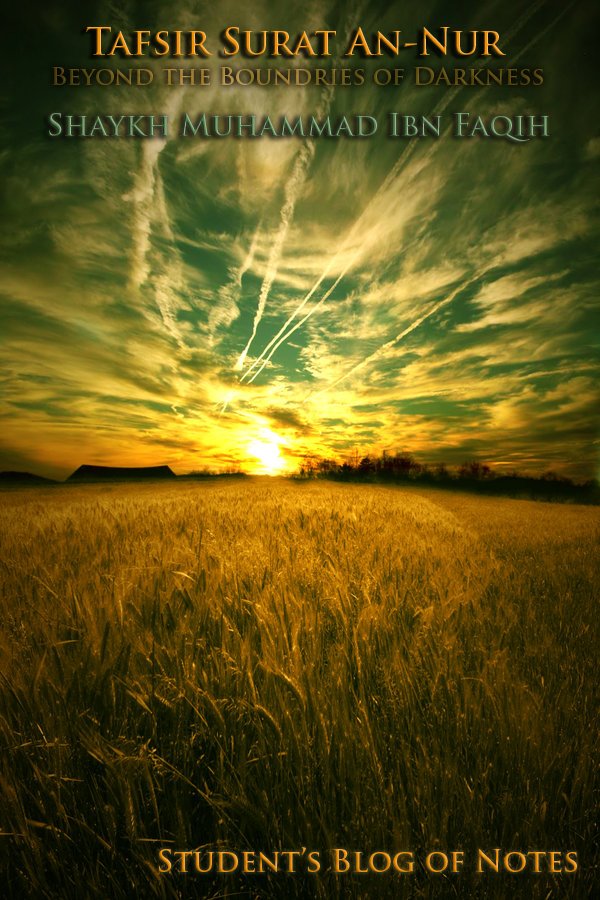Facts about surat al-Nur
- Revealed six years after Hijrah
- It is the 24th surah in the Qur’an
- It is entitled surat al-Nur
- al-Nur is one of the names of Allah (swt).
- There is a connection between surat al-Nur and surat al-Mu’minun (before al-Nur). It is mentioned that the believers protect their chastity. Allah (swt) praised them for that. Surat al-Nur tells us how one can preserve his/her chastity.
Ayahs 1 & 2
Definitions
| Word |
|
| surah | Qur’anic terminology that comes from the root word “s w r.” Sur means fence, which means it surrounds to protect something. A surah in the Qur’an – contains a set of verses.
The word surah is mentioned 9 times in the Qur'an. |
| anzalnaha | We have revealed to you |
| faraDnaha | FaraDa – to break down; to establish; to decree fariDah – an obligatory act |
| ayat | signs; indication; physical evidence |
| bayyinat | clear; used to prove something; evidence |
| la`allakum | perhaps you (plural) |
| tadhakkarun | plural of tadhakkara, which comes from dhakara Dhakara – to remember on your own Tadhakkar – remember as a reaction to stimulus |
| al-Zani | Zina: a sexual act that involves intercourse outside marriage. Zani – male; Zaniah – female Considered zani until tawbah, or unless he performs zina regularly |
| fajlidu | (v.) lash; whip |
| kulla waHidin minhuma | each one of them (both) |
| mi'ah | one hundred |
| jaldah | (n.) lash |
| wa la | la of prohibition |
| ta’khudhkum | to be overtaken by |
| ra’fah | mercy; pity; compassion |
| din Allah | the religion of Allah; ruling; law |
| in kuntum tu’minuna | if you (plural) believe |
| billahi | in Allah |
| wal yawm al-Akhir | and the Last Day |
| wa li-yash-had | a command to witness |
| `adhabahuma | their punishment (both) |
| Ta’ifah | Group |
| min al-Mu’minin | amongst the believers |
| yankiHu | Marry |
| illa | Except |
| mushrik | one who associates with Allah another deity |
| Hurrima | was made forbidden (passive) |
| dhalika `ala | that upon |
Tafsir
- Starting off this surah with an indefinite word, “surah” without being defined with (al-) has caused discussion and debate amongst scholars.
- To get the intention of the reader. “Surat….” What about it? “…we have brought it down…”
- We have revealed as a manifest/clear indication (in terms of its guidance)
- This surah covers a variety of issues (penal laws, etc).
- The Prophet (saws) was approached by a man who said, “My son was employed by this man and he committed zina with his wife (of his boss). I paid a ransom with 100 sheep and a slave girl for him to be forgiven. When I asked the people of knowledge, they said that he should be lashed 100 times and punished for an entire year through an exile.” The prophet (saws) said, “I will settle the ruling of this matter in accordance to the book of Allah. The slave girl & sheep should be returned to you and your son is to be lashed 100 times.”
- Zina involves: illegal sexual intercourse outside of marriage involving consent
- Different types of zina: fornication, adultery, or rape
- A man came to the Prophet (saws) and publicly said, “Oh Messenger of Allah, allow me to commit zina.” The Prophet (saws) counseled with him, connected with him and said, “Would you accept that for your mother? People don’t accept it for their mothers.” This shows that it is an act that is rejected by people. But unfortunately, we live in a society where this is accepted and even celebrated.
- al-Razi makes an argument that why zina is wrong. He says that zina is degrading to women for women are not sex objects (this is being said 900 years ago). Allah (swt) created them to be partners of men. That cannot be achieve when she is devoted to him and he is devoted to her.
- Why did the next ayah start with al-Zaniah instead of al-Zani? Find out for next week.
- This verse applied only if the person committing zina is unmarried.
- In addition, they shall be exiled for one year.
- These punishments are only carried out under an Islamic state.
- “Do not feel sorrow for them in where the laws of Allah are established.”

What was the homework?
ReplyDelete